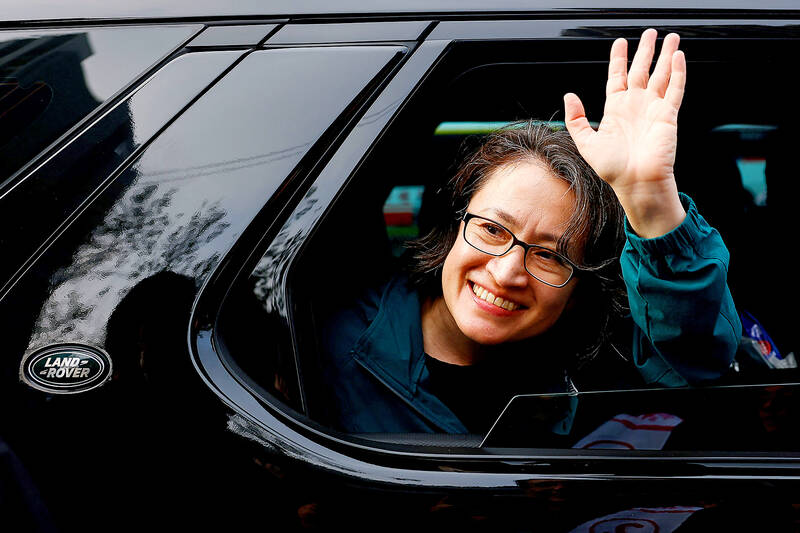Relations between Taiwan and the Czech Republic have flourished in recent years. However, not everyone is pleased about the growing friendship between the two countries.
Last month, an incident involving a Chinese diplomat tailing the car of vice president-elect Hsiao Bi-khim (蕭美琴) in Prague, drew public attention to the People’s Republic of China’s (PRC) operations to undermine Taiwan overseas.
The trip was not Hsiao’s first visit to the Central European country. It was meant to be low-key, a chance to meet with local academics and politicians, until her police escort noticed a car was tailing her through the Czech capital.

Photo: Reuters
The driver ran red lights, almost causing an accident at an intersection. When confronted by authorities, he presented a diplomatic passport issued by the PRC, according to the Czech Internet news site Seznam Zpravy. The driver, who works for the Chinese embassy’s military department, denied allegations he was tailing Hsiao.
“Various incidents occur regularly but a car chase through the city, like something out of an action movie, is quite unusual,” says Simona Fantova, a Czech analyst for the China-focused project Sinopsis.
Even though she considers this incident extreme, Chinese interference in national matters is not unheard of. The PRC is regularly mentioned in the annual report of the Czech Security Information Service (BIS), an agency similar to the FBI. Last year’s report explicitly refers to an effort to suppress any cooperation between the Czech Republic and Taiwan.

Photo: AFP
“China has been strongly opposed to any cooperation with Taiwan and has repeatedly responded by issuing official statements in an effort to draw attention to the crossing of so-called red lines. The BIS interprets these statements as an attempt to deter further strengthening of Czech-Taiwan relations,” the agency reports.
A BITTER BREW
The BIS is not alone in its analysis.
“China has long sought to persuade, not only political representatives but also businessmen, journalists and academics of its point of view. The moment this approach fails, intimidation sets in,” says Ivana Karaskova, analyst and founder of China Observers in Central and Eastern Europe (CHOICE).
Two presidents of the Senate have firsthand experience with Chinese intimidation. Jaroslav Kubera was the first to consider visiting Taiwan during his 2019 diplomatic trip to Asia. He was met with criticism from the Chinese embassy as well as from Czech political elites like ex-president Milos Zeman, a longtime supporter of Sino-Czech relations.
Kubera later received an “invitation for tea” at the Chinese embassy, where he met with the Chinese ambassador behind closed doors. The details of the session remain unknown, but evidence of Chinese meddling and threats are seen in a letter from the embassy addressed to him later.
It had a significantly negative impact on him, his wife recalls. Kubera died from a heart attack a few days later. His wife suspects foul play and requested a toxicological autopsy to rule out poisoning. The request was denied.
SMEAR CAMPAIGN
In some cases, PRC intimidation can take the form of smear campaigns, Karaskova adds. Kubera’s successor, the current head of the Parliament Milos Vystrcil, chose to follow in Kubera’s footsteps and visit Taiwan. His 2020 trip was considered a success. He met with President Tsai Ing-wen (蔡英文) and president-elect William Lai (賴清德). Economic and cultural exchanges between the two countries have followed.
Soon after, the Czech media received a tip alleging a bribe of US$4 million had been paid to Vystrcil for the visit. After a closer inspection, it turned out that the allegations were part of a clumsy smear campaign linked to PRC operations in Switzerland
“The activity of the Chinese embassy in cooperation with some Czech politicians was truly unprecedented,” Fantova says.
PRAGUE INVESTIGATES
Both cases were heavily documented by the media, and greater attention is now being paid to nefarious Chinese activities in Europe.
“I think that awareness of what China is doing in the Czech Republic has increased significantly in recent years,” Karaskova says.
The Czech police force previously removed Tibetan and Uyghur flags during President Xi Jinping’s (習近平) visit to Prague in 2016. Officers were also alleged to have stood by while Chinese supporters used force to remove Czech demonstrators from a road Xi was on. The police have since been urged to be more diligent with regards to China.
“We as a society are better prepared and more sensitive to these Chinese incidents,” Fantova says.
The Czech government too, is becoming more assertive. Minister of Foreign Affairs Jan Lipavsky spoke privately with the Chinese ambassador Feng Biao (馮?) about the allegation Hsiao Bi-khim’s car was followed by a PRC diplomat but was dissatisfied with the explanation provided. An ongoing investigation may result in the diplomat who drove the car being expelled, which would be the first case involving a PRC official of this kind.

Late last month Philippines Foreign Affairs Secretary Theresa Lazaro told the Philippine Senate that the nation has sufficient funds to evacuate the nearly 170,000 Filipino residents in Taiwan, 84 percent of whom are migrant workers, in the event of war. Agencies have been exploring evacuation scenarios since early this year, she said. She also observed that since the Philippines has only limited ships, the government is consulting security agencies for alternatives. Filipinos are a distant third in overall migrant worker population. Indonesia has over 248,000 workers, followed by roughly 240,000 Vietnamese. It should be noted that there are another 170,000

Hannah Liao (廖宸萱) recalls the harassment she experienced on dating apps, an experience that left her frightened and disgusted. “I’ve tried some voice-based dating apps,” the 30-year-old says. “Right away, some guys would say things like, ‘Wanna talk dirty?’ or ‘Wanna suck my d**k?’” she says. Liao’s story is not unique. Ministry of Health and Welfare statistics show a more than 50 percent rise in sexual assault cases related to online encounters over the past five years. In 2023 alone, women comprised 7,698 of the 9,413 reported victims. Faced with a dating landscape that can feel more predatory than promising, many in

“This is one of those rare bits of TikTok fitness advice with a lot of truth behind it,” says Bethan Crouse, performance nutritionist at Loughborough University. “Sometimes it’s taken a bit too literally, though! You see people chugging protein drinks as they’re scanning out of their gym.” Crouse recommends the athletes she works with consume 20-30g of protein within 30-60 minutes of finishing a resistance training session. “The act of exercising our muscles increases the breakdown of muscle proteins,” she says. “In order to restore, or hopefully improve them — and get gains such as increased muscle mass or strength —

“Far from being a rock or island … it turns out that the best metaphor to describe the human body is ‘sponge.’ We’re permeable,” write Rick Smith and Bruce Lourie in their book Slow Death By Rubber Duck: The Secret Danger of Everyday Things. While the permeability of our cells is key to being alive, it also means we absorb more potentially harmful substances than we realize. Studies have found a number of chemical residues in human breast milk, urine and water systems. Many of them are endocrine disruptors, which can interfere with the body’s natural hormones. “They can mimic, block